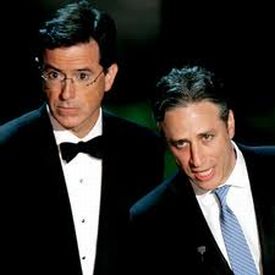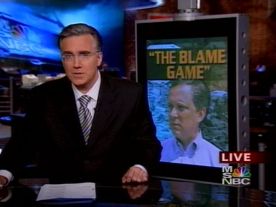Gag Rulers
From The New CriterionWell, that was fun. As a Republican myself — at least I would be if they had registration by party in the Commonwealth of Virginia — I don’t mind admitting that I was glad to see the large swing to the Republicans in the recent mid-term elections even though its practical effects are likely to be few and problematical. There are still no veto-proof majorities — and in the Senate no majority at all — with which to “turn the ship around” (as the G.O.P.’s Senate leader, Mitch McConnell put it) — and the failure to do so is very likely to result in the Republicans’ having to shoulder a share of the blame for whatever may still be wrong with the way the country is being governed in 2012 when both they and the President come up for re-election. But even if their triumph had been unambiguous, the best thing about it would have been the anguish of the media at seeing all their hopes for 40 years of progressive dominance (J. Carville) and the consequent Death of Conservatism (S. Tanenhaus) come to nothing. And better even than that are the intellectual contortions the media have been going through in order to explain away this otherwise inexplicable deviation of “history” from its pre-ordained progressive course.
I do hope I’m allowed to say all this in The New Criterion — a publication which is, needless to say, not affiliated with any political party. Mr Keith Olbermann found what price was to be paid even by opinion-mongers such as he for identifying himself with a partisan cause by giving $7200 to three Democratic candidates in the election: indefinite suspension from hosting “Countdown” on MSNBC! At last the Countdown had arrived at zero. True, once defined, the suspension turned out to be for only two days, but that was doubtless only because somebody at the network must have recognized that it had made itself a laughingstock by suspending for overt partisanship someone who had made his show MSNBC’s most popular — which must be a bit like being the world’s most popular serial composer or the best-selling author of books on Canadian history — by being an overt partisan. As Philip Terzian of The Weekly Standard said, he was “surprised at the greed of the Democrats. For all that he does for them, they still demanded cash from Keith Olbermann.”
Even The New York Times, in reporting his suspension, described Mr Olbermann as “anchor of what is essentially the “Democratic Nightly News.” If the secret is out there, it’s safe to assume it’s out everywhere. Why, then, was the gentleman being punished for doing what he was hired to do? Why get excited by the trifling sum of $7200 when his considerably more valuable in-kind contributions to the Democratic cause apparently never raised an eyebrow among the MSNBC management, or that of their parent company, NBC? Perhaps none of those guys watch his show either. But when even one or two conservatives leapt to Mr Olbermann’s defense and accused the network of hypocrisy, the powers that be quickly found reasons to suspend their suspension. As the network’s president, Phil Griffin wrote, “I have determined that suspending Keith through and including Monday night’s program is an appropriate punishment for his violation of our policy. We look forward to having him back on the air Tuesday night.” So that’s that then.
What seems to have happened is that some of those who have been, along with Roger Ailes of Fox, instrumental in remaking the model of TV news only belatedly realized what they had done by acknowledging, if only tacitly, that the silly and antiquated charade of “objectivity” and “non-partisanship” dating from the Walter Cronkite and Huntley-Brinkley era was, as everyone except those with a vested interest in it already knew it to be, a dead letter. That retrospectively made it especially amusing that Rachel Maddow, Mr Olbermann’s MSNBC stable-mate, had earlier taken his suspension as an occasion to crow about the superiority of their network to Fox, which doesn’t put restrictions on its on-air personalities’ contributions to political causes. “Let this incident lay to rest forever the facile, never-true-anyway, bull-pucky, lazy conflation of Fox News and what the rest of us do for a living,” she said. “We are a news operation, and the rules around here are part of how you know that.” Oops.
Actually, the rules around there, however meaningless and toothless they turned out to be in the end, are how you know that people are finding it increasingly hard to tell the difference between Keith Olbermann and Rachel Maddow on the one hand and the supposedly “mainstream” NBC news operation on the other, since both are expected now officially to maintain and unofficially to flout the outdated pretense of non-partisanship. Certainly Mr Olbermann himself continues to draw the same bogus distinction between himself and his rivals at Fox that Miss Maddow does. That must be why, only days before being suspended, he had announced his own suspension of one of his show’s most entertaining features, charmingly headed “The Worst Person In The World.” This was, of course, like pretty much everything else on the show, wildly oversold. Not only was the Worst Person someone different every night, which could hardly be true if he or she were really the worst person in the world — though it’s true that some people, notably Bill O’Reilly, who has a competing but much more highly-rated show on Fox, were multiple winners — but it was always someone like Mr O’Reilly whose badness consisted principally in having different political views from Mr Olbermann’s.
Yet when, the weekend before the election at his “Rally to Restore Sanity” in Washington, Jon Stewart implied that Mr Olbermann was to have been counted among the presumptive enemies of sanity along with Mr O’Reilly and others of the Fox News channel’s personnel, he must have felt chastened by Mr Stewart’s contention at the rally that “we can have animus and not be enemies.” Here’s how the self-appointed sanity advocate continued that thought:
But unfortunately, one of our main tools in delineating the two broke. The country’s 24-hour, political pundit perpetual panic conflictinator did not cause our problems, but its existence makes solving them that much harder. The press can hold its magnifying glass up to our problems, bringing them into focus, illuminating issues heretofore unseen. Or they can use that magnifying glass to light ants on fire, and then perhaps host a week of shows on the dangerous, unexpected flaming ants epidemic.
Ha ha. Yes, he’s got the media dead to rights there, all right. But the next words out of his mouth were these: “If we amplify everything we hear nothing.” That’s simply not true. It sounds as if it ought to be true, but it isn’t. If we amplify everything we hear a cacophony, perhaps, but we don’t hear nothing. That would be silence, and silence is very far from being the result of amplifying everything. I wonder, however, if it isn’t really silence, at least out of the putative “conflictinator” — from which he presumably excludes his own nightly foray into political punditry — that Mr Stewart really wants to hear.
 |
Mr Olbermann, we might remember, was not the first to feel moved to bank the fires of controversy by Mr Stewart’s chastisement. Six years ago, as I noted at the time (see “Cutting Moral Corners” in The New Criterion of December, 2004), he appeared on CNN’s “Crossfire,” which was the only show on television then or now that was deliberately set up to pit contrasting liberal and conservative viewpoints against each other, and accused its debaters — at that time, Paul Begala and Tucker Carlson — of “hurting America.” Within weeks, CNN announced that it was shutting the show down, which it proceeded to do.
I never understood how robust and sometimes passionate debate was supposed to be hurting America, and I wasn’t sure that Mr Stewart did either. Now I suspected that he was already doing then what he was pretty clearly doing again at the Rally to Restore Sanity which was, as the title suggests, setting himself up as the nation’s arbiter of what would and would not be considered legitimate matter for debate — with the newly-defined illegitimate opinions not-so subtly classed as being tantamount to insanity. It would be unfair to compare this effort, as some on the Internet attempted to do, to the Soviet incarceration of political opponents in insane asylums, as Mr Stewart’s poetic license presumably came out of the same cracker-jack box as Mr Olbermann’s. But his purpose in suppressing debate by means of ridicule was not altogether dissimilar from that of those who had far more frighteningly repressive means at their disposal for accomplishing it during the era of the Red Tsars.
If Keith Olbermann was chastened, he was also defiant, however. In apparent ignorance of the meaning of the word “equivocation,” he said on his show broadcast just after the rally, that “embedded in [Mr Stewart’s] message is an equivocation of the right-wing cable news network, Fox and the one that’s on the left, this one, as if we’re each equidistant from sanity, each equally to blame for the divisions Stewart talks about” — a claim which he then attempted to refute without denying that, if nearer to it than the Fox folks, he was nevertheless in some degree distant from sanity. Nor did he try to defend either the sanity or the non-divisiveness of “The Worst Person in the World” segment, though he did speak of its title as if it were nothing but a harmless joke. All the same, he was pulling the plug on it, he said, as a gesture of good faith — while reserving the right to bring it back at a later date — to see if anyone on the right would reciprocate. It will be interesting for both of us to see if the Olbermann magic can survive the loss of such a striking superlative from that nightly lineup of “reason and fact” — which his guest during the same broadcast, Jonathan Alter, then proceeded to flatter him by pointing to, as Rachel Maddow was soon to do, as the difference between MSNBC and Fox.
In saying so, Mr Alter was echoing, perhaps unconsciously, President Obama who a couple of weeks before had told a gathering of Democratic donors that “Part of the reason that our politics seems so tough right now and facts and science and argument does [sic] not seem to be winning the day all the time is because we’re hardwired not to always think clearly when we’re scared. . .And the country’s scared.” I doubt that he even realized, so natural is the assumption to him, that anyone would notice he was speaking of his own party as that of “facts and science and argument” and his opponents — who on still another occasion he called “enemies” before being forced to correct himself — as the party of fear. Talking of science, by the way, I wonder what a biologist would make of the claim that “we’re hardwired not to always think clearly when we’re scared”? How does that work from an evolutionary point of view? Wouldn’t there be greater survival value in being hardwired to think clearly when we’re scared than not to think clearly? But I think the “science” he is talking about here is really just the sort of amateur psychology he indulged in during the campaign two years ago when he spoke of the “bitter” people in Pennsylvania and the Midwest who “cling to guns or religion or antipathy toward people who aren’t like them or anti-immigrant sentiment or anti-trade sentiment as a way to explain their frustrations.”
What lies behind comments like these, as it does (I believe) behind the Jon Stewart view of the world with its nostalgia for a non-existent past of consensus and comity, is the impulse of the intellectual to arrogate to himself the title of rationality and explain away those who disagree with him as victims of one sort or another of irrationality, preferably as a result of some variety of psychopathology. Mr Stewart handsomely allowed that conservatives could also be sane, but only if they “work together” with their ideological opposites to “solve problems” and “get things done” — things which, therefore, are supposed to have no ideological dimension of their own, or none that matters. Conservatives are themselves sometimes victims of this fatal intellectual temptation, as when Dinesh D’Souza purports to tell us “How Obama Thinks” with reference to the President’s African father’s fashionable academic anti-colonialism. It’s a little less annoying than Oliver Stone’s Oedipal explanation (which he may have picked up from reading Maureen Dowd) of the Bush presidency but not fundamentally dissimilar in its attempt to discredit one’s political opponents by engaging not with what they say but what some superior intellect imagines itself equipped to divine is what they really mean.
The media, who also do this kind of thing all the time, were thus able to explain away the Republican victories in the election as a rejection of rationality in favor of irrational fear and anger. Hadley Freeman in The Guardian thought that “Anger has poisoned the midterm elections.”
Anger is ever so fashionable at the moment. My dears, it’s the emotion de la saison! In the US midterms, it became the new ignorant, which is like saying that harem trousers are the new skinny jeans: the evolution of a simply ridiculous look into something that makes one resemble a hysterical bed wetter.
Matt Lauer on NBC spoke of the election of Senator-to-Be Rand Paul in Kentucky as being the result of a “wave of anger and energy” and had the effrontery to ask Mr Paul himself, “We know you can win an election with anger — can you govern in Washington with anger?” As David Brooks pointed out in The New York Times, when the boot was on the other foot only two years ago, all the media could talk about was the “hope” of the voters made manifest in their election of President Obama; now that his triumph has been answered with one by those whom he calls his “enemies,” the only explanation can be “anger.” Republicans hope too, you know. And Keith Olbermann is there to prove that Democrats can be angry.
Jon Stewart’s partner in staging his rally on the Mall on the weekend before the election, as on the Comedy Central cable channel, was Stephen Colbert who, in his persona as a crazed right-winger (see “The World’s Greatest Blowhards” in The New Criterion of November, 2010) for a while pretended to be staging a rival “March To Keep Fear Alive.” Eventually the joke became tiresome and the media took to referring to the two rallies, nonsensically, as one: “The Rally to Restore Sanity and/or Fear.” But the subtext was essentially the same as the “anger” trope that figured so prominently in post-election analyses and in President Obama’s mentally confused reference to the irrationality of the fear-crazed souls, soon to give the Republicans the House majority, who were unable to understand or appreciate what he and his fellow Democratic rationalists had done for them. He it was who, during his successful campaign of 2008, had urged people to vote on the basis of hope rather than fear, implicitly adopting the view of the anti-war, anti-Bush left that the G.O.P. had sought to exploit people’s excessive fear of terrorism for electoral advantage and to impose on the country a repressive “security state,” and a similar argument still underlies such coded references to “fear” as Mr Colbert’s.
In Britain they are less subtle about it. The discovery there aboard a UPS cargo plane bound for the U.S. of some bombs hidden in printer cartridges, led Mick Hume, the usually level-headed libertarian Marxist — there’s a concatenation of epithets you don’t see every day — who is editor-at-large of Spiked Online to wail, “First they came for our shoes. Then they came for our bottles of water, medicine and mascara. Now they come for our printer ink cartridges. What will the UK and Western authorities target next in their ludicrous war on terror at the airports?” All this, he thought, was a product of the “elite culture of precaution and politics of fear” which used to be characteristic of the Labour government and now appears to have survived intact in its Conservative-Liberal successor. But of course what the “politics of fear” is afraid of is not so much terrorism as the media who, as any conceivable government either in Britain or America knows very well, would crucify it for negligence if, with the benefit of hindsight, some future terrorist attack could be judged to have been preventable by even the most improbable and annoying of precautions.
Most politics is the politics of fear and anger, but that seldom has very much to do with the merits of the arguments on either side. Such motive-hunting is really just a way to shut off the arguments of one’s opponents without having to answer them. It seems to me that the assumption of those who seek to do that is that the business of government and politics is perspicuous, at least to the intelligent (like themselves), and that, therefore, the seemingly difficult problems it poses are really not difficult, perhaps not even problems, at all. Jon Stewart and President Obama, who engaged in a slightly surreal interview before the rallies, are both in their distinct ways in as little doubt about the course that a perfectly good and wise ruler would set for the country as Paul Krugman is, which is why they must assume that those who have a different idea about it from their own must be either stupid, corrupt or irrational. Perhaps even insane, as Mr Stewart did not quite say. One must suppose, so as not to fall into the same trap they do, that they really believe this, but it does at times seem to come under the heading of that well-known category first identified by George Orwell of “ideas so absurd that only an intellectual could believe them.”
Discover more from James Bowman
Subscribe to get the latest posts to your email.






